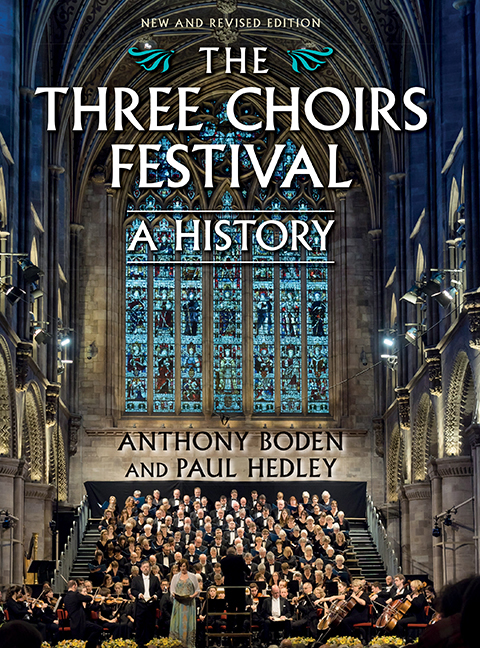Book contents
- Frontmatter
- Contents
- List of Illustrations
- Preface
- Acknowledgements
- List of Abbreviations
- List of Cathedral Organists
- 1 Origins
- 2 A Fortuitous and Friendly Proposal
- 3 A Numerous Appearance of Gentry
- 4 ‘The Musick of my Admiration Handel’
- 5 The Gentlemen and the Players
- 6 Avoiding Shipwreck
- 7 Prima voce
- 8 Favourites and Flops
- 9 Sacred and Profane
- 10 Froissart
- 11 The Unreasonable Man
- 12 The Dream
- 13 Beyond these Voices
- 14 An Essentially English Institution
- 15 The Elgar Festivals
- 16 Dona nobis pacem
- 17 Recovery
- 18 Association
- 19 A New Epoch
- 20 Jubilee
- 21 Theme with Variations
- 22 Houses of the Mind
- 23 ‘A Gold-Plated Orchestra’
- 24 A New Millennium
- 25 Reorganisation
- 26 An Invitation to the Palace
- Appendix Three Choirs Festival Timeline
- Select Bibliography
- Index
- Plate section
10 - Froissart
Published online by Cambridge University Press: 11 August 2017
- Frontmatter
- Contents
- List of Illustrations
- Preface
- Acknowledgements
- List of Abbreviations
- List of Cathedral Organists
- 1 Origins
- 2 A Fortuitous and Friendly Proposal
- 3 A Numerous Appearance of Gentry
- 4 ‘The Musick of my Admiration Handel’
- 5 The Gentlemen and the Players
- 6 Avoiding Shipwreck
- 7 Prima voce
- 8 Favourites and Flops
- 9 Sacred and Profane
- 10 Froissart
- 11 The Unreasonable Man
- 12 The Dream
- 13 Beyond these Voices
- 14 An Essentially English Institution
- 15 The Elgar Festivals
- 16 Dona nobis pacem
- 17 Recovery
- 18 Association
- 19 A New Epoch
- 20 Jubilee
- 21 Theme with Variations
- 22 Houses of the Mind
- 23 ‘A Gold-Plated Orchestra’
- 24 A New Millennium
- 25 Reorganisation
- 26 An Invitation to the Palace
- Appendix Three Choirs Festival Timeline
- Select Bibliography
- Index
- Plate section
Summary
DURING William Done's fifty-one years at Worcester he had worked with Gloucester colleagues John Amott, Samuel Sebastian Wesley, Charles Harford Lloyd and Charles Lee Williams; and with George Townshend Smith, Langdon Colborne and George Robertson Sinclair at Hereford.
Lloyd made his Three Choirs debut in the organ loft at the Hereford Festival of 1876. Selections from Samson and The Creation in the gaslit cathedral provided a special attraction at an evening concert: ‘Lurid glares of gas fell upon the stately pillars, and pierced through gloom to the far-off roof, giving a weird-like appearance to nave and aisle.’
A Gloucestershire man, born at Thornbury in 1849, Lloyd had graduated in Arts and Music at Magdalen Hall, Oxford. At his first Gloucester Festival, in 1877, it quickly became apparent that the young new cathedral organist was a musician of ability and distinction, and, moreover, one who seemed 'to possess the right stuff for a conductor, combining those essential attributes of firmness, quietude, and self-control, in the absence of which any hope of reaching eminence as a ruler in this particular sphere of art-demonstration must be altogether illusory. The Musical Times reserved to the end of a review of the week's events a notice of especial praise for Lloyd's conducting, praising ‘not only his skill in conveying … an accurate knowledge of the tempi of the several pieces, but his evident intimate acquaintance with the scores, and the intelligence he evinced in the endeavour to realise every point indicated by the composer.’
Lloyd was an innovator. We have already noted his introduction at the Gloucester Festivals of Brahms's Ein deutsches Requiem in 1877 and of Beethoven's Missa solemnis in 1880, both drawing much-needed oxygen into the suffocating ultra-conservatism of nineteenth-century provincial taste. We have seen too that Parry's Prometheus Unbound, accepted by Lloyd for performance in the 1880 Festival, was later identified as the work which marked the birth of the renaissance of English music.
- Type
- Chapter
- Information
- The Three Choirs Festival: A HistoryNew and Revised Edition, pp. 144 - 152Publisher: Boydell & BrewerPrint publication year: 2017

